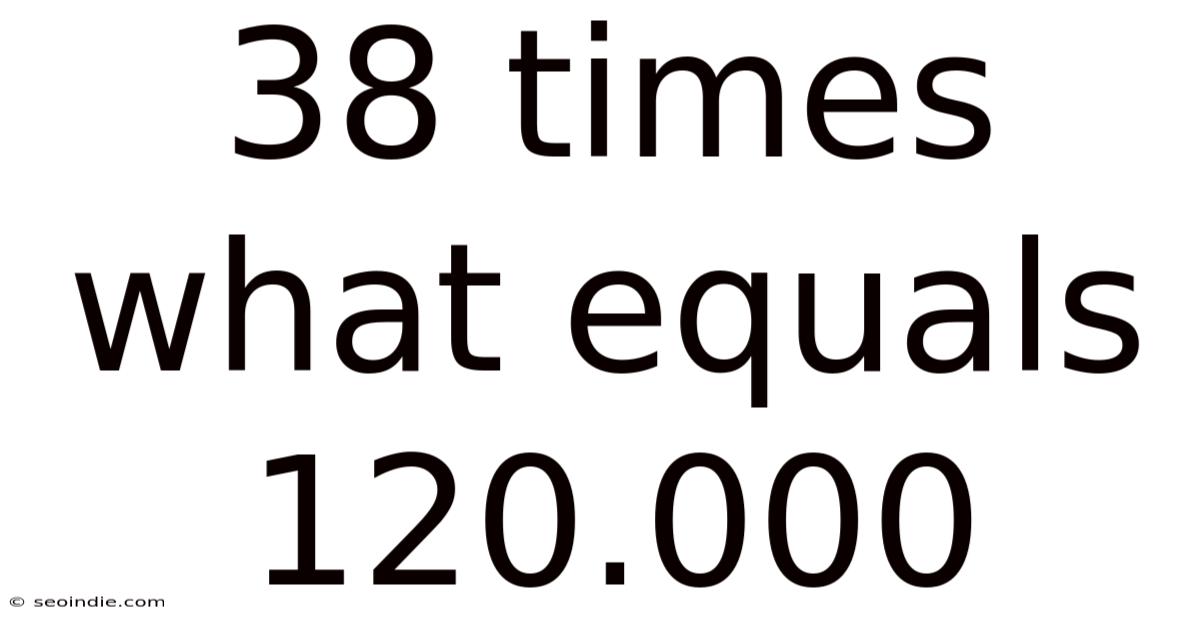38 Times What Equals 120.000
seoindie
Sep 11, 2025 · 4 min read

Table of Contents
Deconstructing the Problem: 38 Times What Equals 120,000?
Finding an unknown value in a multiplication problem might seem daunting at first, especially when dealing with larger numbers like 120,000. But understanding the underlying principles of algebra makes solving this – and similar problems – straightforward. This article will not only provide the solution to "38 times what equals 120,000?" but also delve into the mathematical concepts involved, offer different approaches to solving the problem, and explore related applications. We'll cover everything from basic arithmetic to more advanced algebraic techniques, making this a comprehensive guide for anyone struggling with similar mathematical inquiries.
Understanding the Problem
The core of the problem is a simple algebraic equation. We can represent it as:
38 * x = 120,000
Where 'x' represents the unknown value we need to find. This equation states that 38 multiplied by some number ('x') equals 120,000. Our goal is to isolate 'x' and determine its value.
Method 1: Using Division
The most direct approach to solving this equation is by using division. Since multiplication and division are inverse operations, we can isolate 'x' by dividing both sides of the equation by 38:
x = 120,000 / 38
Performing this division gives us the answer:
x = 3157.8947...
Therefore, 38 multiplied by approximately 3157.89 equals 120,000. The result is a decimal because 120,000 is not perfectly divisible by 38.
Method 2: Long Division
For those who prefer a more manual approach, long division provides a step-by-step method to arrive at the same answer. While calculators offer speed and convenience, understanding long division enhances mathematical comprehension. Here's how to perform the long division of 120,000 by 38:
3157
38 | 120000
-114
60
-38
220
-190
300
-266
340
-304
360
-342
18
The quotient (the result of the division) is 3157 with a remainder of 18. This remainder confirms the decimal result obtained earlier using a calculator.
Method 3: Estimation and Refinement
Before resorting to calculators or long division, a good strategy involves estimation. We can round 38 to 40 for easier mental calculation. Dividing 120,000 by 40 gives us 3000. This provides a reasonable initial estimate. Knowing that we rounded up, we expect the actual answer to be slightly larger than 3000. This estimation helps us check the plausibility of our final answer obtained through more precise methods.
Method 4: Algebraic Manipulation
While the division method is the most straightforward, understanding the algebraic manipulation strengthens mathematical foundations. We can rearrange the equation as follows:
38x = 120,000
Dividing both sides by the coefficient of x (which is 38):
x = 120,000 / 38
This explicitly demonstrates the algebraic process of isolating the variable 'x' to solve the equation. This approach is valuable for more complex algebraic problems.
Understanding the Decimal Result
The decimal result (3157.8947...) signifies that 38 multiplied by 3157 gives a result slightly less than 120,000. The decimal part represents the fraction remaining after the whole number division. We can express this remainder as a fraction or round the decimal to a desired level of precision. For instance, rounding to two decimal places gives 3157.89. Rounding to the nearest whole number gives 3158. The level of precision depends on the context of the problem.
Practical Applications
This type of problem frequently appears in various contexts:
- Business and Finance: Calculating unit costs, profit margins, or determining quantities based on pricing. For example, if a company needs 120,000 units of a certain material and each supplier's minimum order quantity is 38 units per package, the company would need to order 3158 packages (rounding up to ensure they have enough).
- Engineering and Construction: Determining material quantities, project timelines, or resource allocation.
- Everyday Life: Dividing resources equitably among a group of people, calculating fuel consumption, or planning travel distances.
Frequently Asked Questions (FAQ)
-
Q: Why is the answer a decimal? A: Because 120,000 is not perfectly divisible by 38. There's a remainder after the division, resulting in a decimal value.
-
Q: How do I round the decimal? A: Rounding depends on the required level of precision. You can round to the nearest whole number, tenth, hundredth, etc., based on the problem's context.
-
Q: Can I use a calculator? A: Absolutely! Calculators are useful tools for quickly performing calculations. However, understanding the underlying mathematical principles is equally important.
-
Q: What if the numbers were different? A: The same principles apply. Replace the numbers with your desired values and follow the steps outlined above (division or algebraic manipulation).
Conclusion
Solving "38 times what equals 120,000?" requires understanding basic algebraic concepts and applying the appropriate mathematical operations, primarily division. We explored multiple methods, highlighting the importance of both direct calculation and algebraic manipulation. The decimal result highlights the need for understanding remainders and rounding techniques. By mastering these techniques, you'll not only solve this specific problem but also gain the skills to tackle similar problems in diverse contexts, demonstrating a strong foundational understanding of arithmetic and algebra. Remember, the key is not just to find the answer but to understand the process and its relevance. This understanding will serve as a valuable asset in various academic and real-world applications.
Latest Posts
Latest Posts
-
Factors Chart 1 To 100
Sep 11, 2025
-
How Many Feet Is 71
Sep 11, 2025
-
Conjugated System In Organic Chemistry
Sep 11, 2025
-
One Cubic Foot To Gallons
Sep 11, 2025
-
What Equals 26 In Multiplication
Sep 11, 2025
Related Post
Thank you for visiting our website which covers about 38 Times What Equals 120.000 . We hope the information provided has been useful to you. Feel free to contact us if you have any questions or need further assistance. See you next time and don't miss to bookmark.